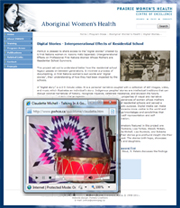 |
|||||||||||||||
|
|||||||||||||||
|
|||||||||||||||
| kiskinohamâtôtâpânâsk:
Inter-generational Effects on Professional First
Nations Women Whose Mothers are Residential
School Survivors |
|
||||||||||||||
|
R. Stout & S. Peters Report Summary PWHCE's report, kiskinohamâtôtâpânâsk: Intergenerational Effects on Professional First Nations Women Whose Mothers are Residential School Survivors, shares the stories of First Nations women affected by the legacy of residential schools. Their stories speak to complex family relationships, mothering, identity, resilience and ultimately healing. This report builds upon PWHCE’s previous study, kiskâyitamawin miyo-mamitonecikan: Knowing Mind Fullness – Urban Aboriginal Women & Mental Health, which demonstrated that Aboriginal women’s health needs are inadequately understood and addressed by current health services. The recommendations recognized how effects of residential schools transmit through families and communities to contribute to a cluster of health issues. Further, the gendered analysis of women’s mental health issues augments previous research findings that colonization and ongoing colonial practices are at the root of many Aboriginal women’s mental health issues. Placing Aboriginal women’s stories at the centre of research yields a wealth of ideas about health and wellbeing, how health issues might be addressed, and the factors that increase resiliency. In 2008, Prime Minister Stephen Harper's formal apology to former students of residential schools recognized that the “policy of assimilation was wrong [and] has caused great harm... [children were] inadequately fed, clothed and housed.... All were deprived the care and nurturing of their parents, grandparents and communities”. He also acknowledged that the “Legacy of Indian Residential Schools has contributed to social problems that continue to exist in many communities today”. While there has been ongoing research on the effects of residential schools on survivors, there have been few studies looking at how the schools have affected the children of residential school survivors. Likewise, professional First Nations women tend not to be included in research documenting inter-generational effects of residential schools. Rather, research tends to focus on poverty issues and ‘at-risk’ populations. Nonetheless, inter-generational effects of residential school are not confined to women in poverty; they unfold for First Nations women irrespective of economic circumstance. Residential schools produced disconnection and emotional distance from family members, culture, language, land, community and traditions. They often left survivors with memories which were too difficult to recall or to disclose with their children. Yet there are instances when mothers and daughters and their children attempt to unblock the flow of experiences, to talk about their pain with others, to reconnect with each other and family members, sometimes through actions when the words could not flow. By listening to the stories of women whose mothers are residential school survivors, it is clear that the residential school system has produced ongoing effects for subsequent generations. Their stories take us on the daughters’ journeys, sharing their experiences of coping, parenting their own children, being successful, being resilient and healing. Daughters’ stories also provide a glimpse into the next generation, the effects on their own children, and full circle to the relationships these children have with the survivors' generation. Their stories tell us a great deal about determination and resiliency and how these are passed through the generations. Many mothers passed on their abilities to deal with crisis, to survive extraordinary and everyday struggles, even though they had limitations, and to love in the ways they could. Even in the face of their experiences in residential schools, some survivors strongly encouraged daughters to get an education so that daughters could have an easier life than they did and could be independent and successful. Often the stories depict the irrepressible strength, determination and self-sufficiency that mothers passed down through the generations, modeling strength, surviving, and trying to make a life for their families. Ultimately, women’s stories share their healing journey, encompassing emotional, physical, intellectual and spiritual aspects. Sharing their stories is an important part of the healing process. When we add these women’s stories to the stories of many other Aboriginal women, men, Elders and children, it forms the knowledge to counter ongoing legacies of “civilization” and “assimilation”. The wisdom and awareness about inter-generational effects of residential schools resides in the collective and individual experiences, memories, bodies and spirits of women and other First Nations people. From the stories, we can better understand these women’s resiliency in reconnecting children and adults with their health, families, traditions, and cultures.
Back to top of page |
|||||||||||||||
This website is copyrighted by the
Prairie Women's Health Centre of Excellence, © 1998-2011.
Website design: Pamela Chalmers E-mail: pwhce@uwinnipeg.ca. |
|||||||||||||||
 |
|||||||||||||||


 One page summary
One page summary